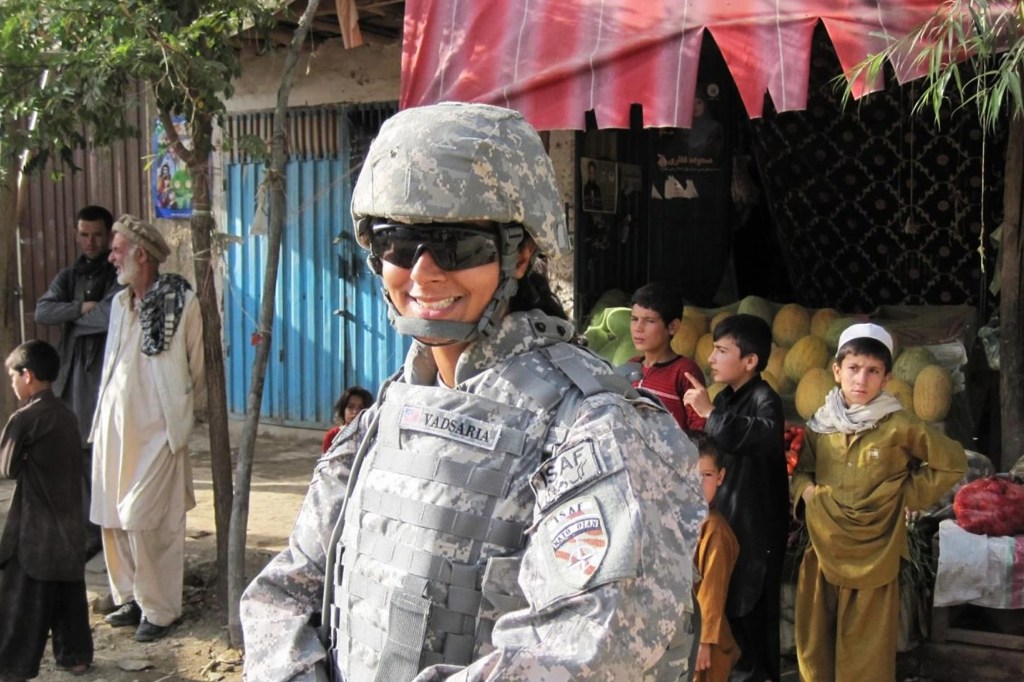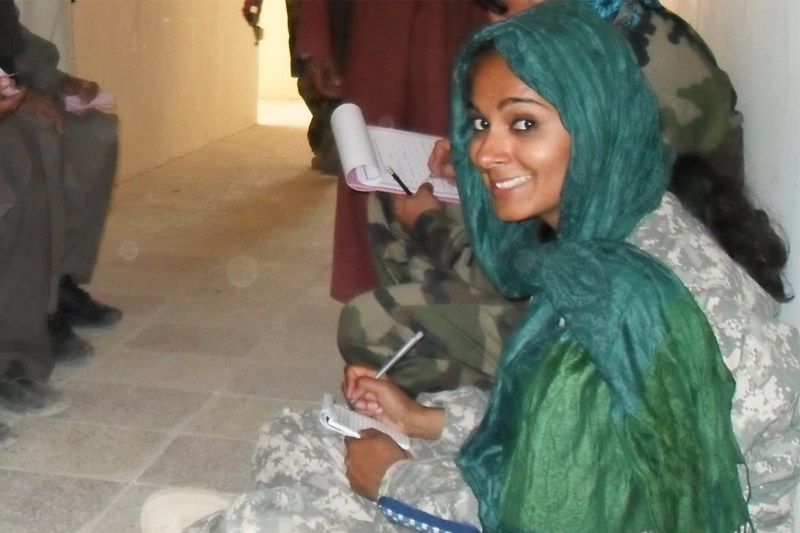Alumna helps military build Afghan-US relations

In the post-Vietnam era, it takes more than military might to win a war. That’s why the work of people like Naheed Vadsaria, DMSB’02, is so important to the success of modern military operations.
Vadsaria served as a civilian social scientist embedded with French and American coalition forces during the height of the war in Afghanistan. Her job while in the country from 2010 to 2011 was to develop relations with Afghan villagers, particularly women, so that military leaders would better understand the local culture. The ultimate goal of this “hearts and minds” strategy was to create allies among the Afghan people, thereby reducing the burden on U.S. forces.
Riding with coalition forces in tanks, helicopters, and armored troop carriers, Vadsaria visited villages throughout Kapisa Province as part of the military’s Human Terrain Systems program. As a Muslim woman educated in the West, she was ideally positioned to learn the intricacies of Afghan culture and use that knowledge to educate coalition military leaders.
“The overall goal is to humanize everybody,” she says. “Humanize the Afghans to the military, but also humanize the military to the Afghans.”
Her second task was to make sure the assistance that the military provided to the local population had the desired impact.
“Our job was to understand their needs,” says Vadsaria. “For example, the military was focused on building schools, but the real problem was that there were no teachers. The military was putting all this money into construction without creating any means to utilize that construction. We recommended that they focus more on training teachers.”
The military was focused on building schools, but the real problem was that there were no teachers.
Naheed Vadsaria
When locals were upset that road construction was destroying their land, Vadsaria’s unit created a road compensation fund for the people harmed by the military’s efforts.
When Vadsaria returned to the U.S., she published an e-book, Tajik Hope, in which she discusses her experiences among Afghanistan’s second-largest ethnic group, Tajiks. The book offers a series of case studies that provide insights into the role of Tajik women, which is far more important than most Westerners realize because they have such a strong influence over the values and character of their children.
Since her time in Afghanistan, Vadsaria has worked as an IT security officer, served as a business consultant in Gambia, and is now earning her MBA at Johns Hopkins University. After graduation, she hopes to start her own social enterprise to help educate women in IT and other STEM professions.
A global perspective
Vadsaria was born in Pakistan and moved to the U.S. with her parents at age 4. As a business major at Northeastern and a work-study student in what is now the university’s Office of Global Services, she developed a passion for international affairs and made friends from all over the world.
Following graduation, she did a two-year stint with the Peace Corps in Gambia, then earned a master’s degree in international policy at the Middlebury Institute of International Studies at Monterey in California. Her studies led to her work with the military in Afghanistan.

Living in a refurbished shipping container on a forward operating base in a war-torn country was a challenge. There was the constant threat of land mines or getting caught in a firefight while traveling to remote regions, and smaller challenges such as communal bathrooms, navigating by flashlight at night because of blackout protocols, and living for a year among mostly men.
“No matter where women work, live, or travel in this world, there are always hurdles for women,” says Vadsaria. “It was sometimes a hard environment to live in, but when you love your job, you overcome any adversity to ensure the mission is completed.”
Being a woman was also an enormous asset, as it gave her access to half the Afghan population that’s generally off limits to Westerners. But Vadsaria believes it was her cultural knowledge and sensitivity that helped her gain access to Afghans of both genders.
“I was respected both because I was a Muslim and spoke Urdu,” she says. “If you know the language, you can break any barriers.”





